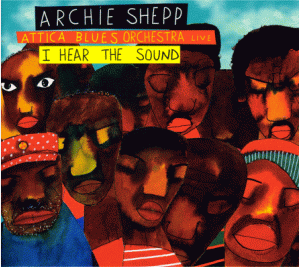In this first article I submit to Steemit, I propose a way of understanding self-identity that is based on perception. I will show that I am sound. Taken literally, it seems like a preposterous idea: “I am sound”. Must be a metaphor. But it is not. It can be shown that I, genuinely, ‘am’ sound. Any 'I' is sound. The approach that yields this realisation involves examining the perception of sound as informed by experience. This is an understanding of sound that is very different to a scientifically informed one. The scientific conception of sound is, here, bypassed.
Bypassing a scientifically informed world view does not mean refuting science. It means engaging with another perspective by which a different understanding can be reached. In this article, that perspective is experience. It is a perspective that is always immediately available and it is a perspective that logically, necessarily, precedes the scientific world view. It should be stated, however, that the perspective of experience, its attendant background of consciousness, and its perceptual and cognitive content has long posed a problem for science. One of the great philosophers of the 17th century Gottfried Leibniz, for example, articulated in The Monadology (1714) that perception is “inexplicable by mechanical causes, that is, by figures and motions”. More recently the Australian philosopher David Chalmers has labelled the attempt to explain our qualitative phenomenal experiences as the “hard problem of consciousness” (1995, Facing Up to the Problem of Consciousness). To illustrate the gulf between science and experience, consider the experience of the two colours red and orange: there is a qualitative difference that we are intimately aware of, but that cannot be explained, let alone adequately observed, by science.

The examination of the experience of sound produces an understanding of perception that is very different to the scientifically informed one. In the experience of sound, it is impossible to identify an act of perception as something that causes a perceived thing: a percept. In the experience of sound, sound simply and magically appears in consciousness, without any intrinsic awareness that an organ has carried out the sensing. The reciprocal of the absence of an act of perception is that there cannot be any perceiver that engages in that act. Unlike the scientific word view, in the experience of sound there is no subject, no ‘self’.
The empirically informed scientific understanding of hearing tells a very different story. It is focused on the mechanism leading to the percept that occurs within the subject: a physical object vibrates, it causes changes in air pressure around it, those changes in pressure travel as waves moving through air, they reach the ear, affect the drum in the inner ear, which in turn translates the signal to the human nervous system, ultimately resulting in a perception.

In the scientific understanding a sound is distinct from the person who has a sound-sensing organ; and this sound-sensing organ allows the person to ‘sense’, or ‘perceive’, the sound. In the experience of sound, however, none of the above mechanism makes itself known. For example, when one hears a loud unexpected sound one does not become aware of a sudden change in the movement of the ear drum. When asked to point to a sound, the listener will point to the apparent source of the sound, not to the changes in air pressure that lie just outside the ear drum. The physical, biological, neurological act of hearing is largely transparent to the experience of sound. The mechanism of hearing may be scientifically and empirically observable, but in the experience of sound, all that happens is sound simply, magically, ‘appears’ in consciousness.
Now, consider the comparison of the act of hearing a sound with the act of kicking a ball. Both scenarios have a subject / verb / object.

It might be correct to say “I kick the ball” because I can identify a ball (without it being kicked), I can reproduce the act of kicking (without a ball), and I can identify my foot (without either kicking or a ball).
But it is NOT correct to say “I hear the sound”. This is because, firstly; I cannot perceive a sound other than to hear it, and secondly; I cannot hear anything that is not a sound. Simply put the words ‘hear’ and ‘sound’ are redundant. I may be able to catch a ball, and kick a box, but I cannot hear a light, nor smell a sound. All I can do to a sound is hear it, and all I can ever hear is sound. It is thus more accurate to say “I hear” or “I am conscious of sound”.
To prove this to oneself only requires looking for the separation between hearing and sound. The separation between a ball and kicking is clear; it is demonstrable simply by showing that one can kick something else. But where does hearing stop and sound begin? Conceptually speaking, it might be suggested that the sound stops on one side of the ear drum, and the hearing begins on the other. Yet, as stated above, there is absolutely no evidence of the hearing organ when sound appears in consciousness. In the experience of sound, there is no line between sound and the supposed act of hearing. In fact, the act of hearing doesn’t actually seem to exist. All that exists is the awareness of the sound itself. There is apparently no perception, just a percept.
If we take this logic further, it turns out that it is similarly impossible to identify an ‘I’ or ‘self’ (the thing that perceives) as separate from the sound itself. In the statement “I hear”, where is the line that has ‘I’ on one side and hearing on the other?
It is easy to direct one’s attention to a sound, and focus on it. One can listen to a sound, and start to identify more detail within it … more patterned textures, more detail in its timbre, new component frequencies not noticed before etc. But if one tries to direct one’s attention to ‘I’ it becomes extremely difficult to find anything. It is hard enough to find this ‘I’, whatever that might be, let alone try to find more detail about it. If you think you have found this ‘self’ try to focus on it and identify more of its detail in the same way that one can focus on sound and identify more detail in a perceived sound.

The notion that a perceiver cannot be found to accompany a percept (or otherwise) is not new. The lack of any experiential evidence of a ‘self’ was articulated by 18th century Scottish philosopher David Hume in his A Treatise on Human Nature:
… when I enter most intimately into what I call myself, I always stumble on some particular perception or other, of heat or cold, light or shade, love or hatred, pain or pleasure. I never can catch myself at any time without a perception, and never can observe any thing but the perception.
… If any one, upon serious and unprejudiced reflection thinks he has a different notion of himself, I must confess I call reason no longer with him. All I can allow him is, that he may be in the right as well as I, and that we are essentially different in this particular. He may, perhaps, perceive something simple and continued, which he calls himself; though I am certain there is no such principle in me.
 Archie Shepp’s album “I Hear the Sound” could more accurately be called “There is The Sound”
Archie Shepp’s album “I Hear the Sound” could more accurately be called “There is The Sound”
In A Treatise on Human Nature Hume characterises individuals as a ‘bundle of different perceptions’ in ‘perpetual flux’ and without a persistent self. Hume’s understanding is clearly informed by the observation of experience rather than an ‘objective’ scientific view. If one observes the experience of sound, and genuinely tries to find evidence of a self doing some hearing, it will not be found. Above, the phrase “I hear a sound” has been corrected to “I am conscious of sound”. In the absence of an identifiable ‘self’, in the experience of sound, the phrase “I am conscious of sound” must further be corrected to the statement: “there is sound“.
So how can I say “I am sound”? Outside of my perceptions, what am I? If one was to be deprived of all senses, touch, smell, sight, taste, sound then what would be left? Would there be an ‘I’ left? Perhaps there would only be an ‘I’ left that can do nothing else but think? But, from the perspective of experience, is there a ‘self’ that is responsible for thinking?
In his Tractatus Logico-Philosophicus 20th century Austrian-born philosopher Ludwig Wittgenstein argues:
5.631 There is no such thing as the subject that thinks or entertains ideas.

Ludwittgenstein extends the idea that there is no ‘self’ evident in perception, to the idea that there is no self, no centre, no subject, present in thinking. This can be understood as an extension of Hume’s observations from perception to cognition (cognition is, broadly speaking, what happens in our minds after perception). Just as Hume says that there is no evidence of a ‘self’ in perception, Wittgenstein extends the absence of this ‘self’ to thinking. Of course, some (including myself) would argue that we do not control thinking, but instead are merely ‘aware’ of our thinking. In this understanding, thoughts and emotions are perceived just as colours and sounds are perceived: they just magically appear in our consciousness.
If I was deprived of all senses and the ability to think, what is left? Where is the self? Who would I be?
It is at this point in this inquiry that I conclude “I am sound”. By that, I mean that I am all of my perceptions, including the awareness of thoughts. There is, here, a critical point that needs to be emphasised: there is no ‘outside world’. There is only my world. This point can perhaps best be articulated by saying that there is no ‘outside world’ that causes these perceptions, rather; my world is these perceptions. In Wittgenstein’s words:
5.63 I am my world. (The microcosm.)
Inverting Wittgenstein’s statement offers a slightly different emphasis: my world is me. What is being challenged is that there is a distinction between a notional ‘outside world’ and a separated independent ‘self’ that exists within and acts within this ‘outside world’.
5.632 The subject does not belong to the world: rather, it is a limit of the world.
When I become aware of a sound, I am that sound. I am the world that magically appears in my experience.
Not bad, a little verbose and not too readable though. I don't really consider the statement "I am sound" particularly different from the concept of identity as a summation of all perceptions and associations, which isn't a foreign concept to empiricism.
The strong points here were analyzing quotes and contextualizing them into the point you were making.
We have similar influences, particularly Hume, so I'd be interested in hearing more. You may want to consider looking into propositional logic if you're into this sort of free form examination.
Thanks for the comment @teslalifestyle. I'm trying to think through your point that these ideas are not too different to identity as the summation of all perceptions. I'll think that further.
I haven't read that much Hume but included him here because of the striking resonance of those few concepts he expounded. I must read him more deeply. Will look at propositional logic today ... thanks for the heads up.
Good post my friend i am @djnoel :))))
Hi @djnoel, thanks for reading! I've just joined Steemit ... will look up your profile, and listen to some of your tunes.
Congratulations @rondari! You have completed some achievement on Steemit and have been rewarded with new badge(s) :
Click on any badge to view your own Board of Honor on SteemitBoard.
For more information about SteemitBoard, click here
If you no longer want to receive notifications, reply to this comment with the word
STOPCongratulations @rondari! You received a personal award!
You can view your badges on your Steem Board and compare to others on the Steem Ranking
Vote for @Steemitboard as a witness to get one more award and increased upvotes!